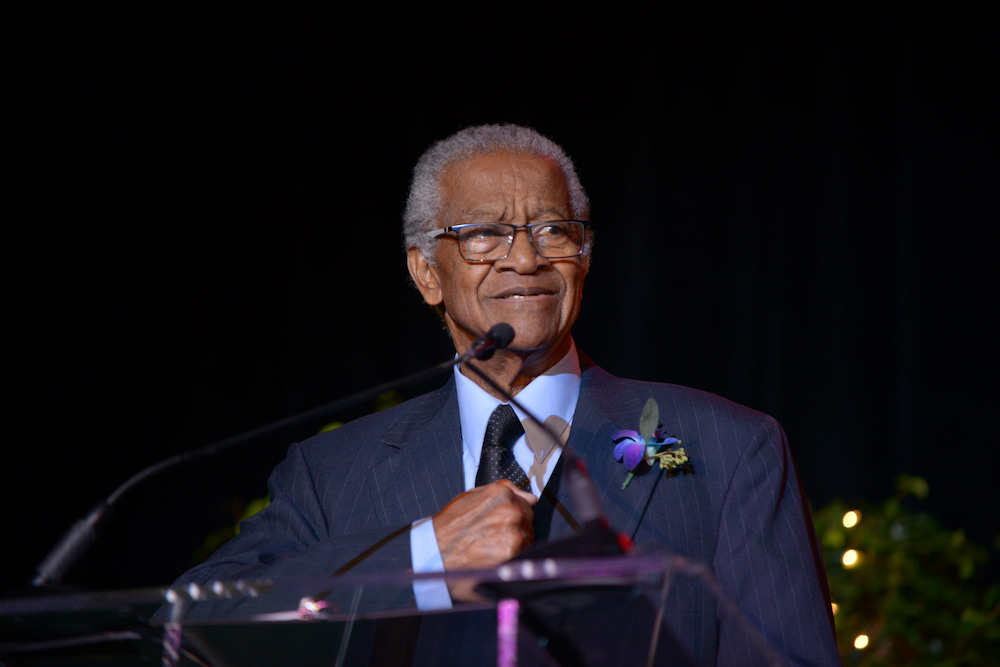Dr. Aaron Shirley to receive national medical school award for diversity efforts

Dr. Aaron Shirley, who broke a racial barrier at the University of Mississippi Medical Center in 1965 and is one of the state’s civil rights icons, will receive the 2013 Herbert W. Nickens Award from the Association of American Medical Colleges.
Honored for his lifetime of service in support of diversity in medical education and the elimination of health disparities, Shirley will receive the award at a black-tie gala Saturday at the AAMC’s annual meeting in Philadelphia, Pa. He is slated to deliver a “thought leader” lecture at the conference Monday.
“For all of his adult life, he has been a courageous champion of civil rights and equal access to health services for African Americans,” said Dr. LouAnn Woodward, UMMC’s associate vice chancellor for health affairs and vice dean of the School of Medicine, who nominated Shirley for the award.
Shirley said the national award was “a surprise, but a very pleasant surprise. I will try to live up to the expectations that go along with this great award.”
Originally from Gluckstadt, Shirley completed medical school and an internship in Tennessee before entering private practice in Vicksburg. He set his sights on a pediatric residency out of state, but was invited to apply for a training slot at UMMC by then chair of pediatrics, Dr. Blair E. Batson. After much prayerful consideration, he accepted, becoming the first African-American resident — and the first black learner in any program — at UMMC in 1965.
He went on to serve as a clinical instructor in the Department of Pediatrics for more than 40 years. His career highlights in health care include co-founding the Jackson-Hinds Comprehensive Health Center, which became a model for federally funded community health centers nationwide, and development of the Jackson Medical Mall in partnership with Jackson State University, Tougaloo College and UMMC.
“He envisioned the empty and vandalized shopping mall in a blighted area of the city as a one-stop shop for medical care and other public services,” said Woodward. “With skill and persistence, he persuaded medical and civic leaders to invest in the restoration of a building and ultimately a neighborhood.”
Today the mall is home to the UMMC Cancer Institute and the Jackson Heart Study, the nation’s largest long-term evaluation of risk factors for cardiovascular disease in African Americans.
Shirley recently embarked on a venture to establish “health houses” as part of an integrated network in the Mississippi Delta based on a model developed in Iran. His efforts were recently profiled in a New York Times Magazine cover story.
Even in retirement, Shirley continues to be active, saying he still spends a lot of time “dreaming.”
“(I’m) trying to continue to make things better for those who need help, especially related to health care,” he said.
Herbert W. Nickens, for whom the award is named, was the founding vice president of the AAMC’s Diversity Policies and Programs unit. “His passionate leadership contributed greatly to focusing national attention on the need to support underrepresented minorities in medicine,” according to the AAMC.
Honored for his lifetime of service in support of diversity in medical education and the elimination of health disparities, Shirley will receive the award at a black-tie gala Saturday at the AAMC’s annual meeting in Philadelphia, Pa. He is slated to deliver a “thought leader” lecture at the conference Monday.
“For all of his adult life, he has been a courageous champion of civil rights and equal access to health services for African Americans,” said Dr. LouAnn Woodward, UMMC’s associate vice chancellor for health affairs and vice dean of the School of Medicine, who nominated Shirley for the award.
Shirley said the national award was “a surprise, but a very pleasant surprise. I will try to live up to the expectations that go along with this great award.”
Originally from Gluckstadt, Shirley completed medical school and an internship in Tennessee before entering private practice in Vicksburg. He set his sights on a pediatric residency out of state, but was invited to apply for a training slot at UMMC by then chair of pediatrics, Dr. Blair E. Batson. After much prayerful consideration, he accepted, becoming the first African-American resident — and the first black learner in any program — at UMMC in 1965.
He went on to serve as a clinical instructor in the Department of Pediatrics for more than 40 years. His career highlights in health care include co-founding the Jackson-Hinds Comprehensive Health Center, which became a model for federally funded community health centers nationwide, and development of the Jackson Medical Mall in partnership with Jackson State University, Tougaloo College and UMMC.
“He envisioned the empty and vandalized shopping mall in a blighted area of the city as a one-stop shop for medical care and other public services,” said Woodward. “With skill and persistence, he persuaded medical and civic leaders to invest in the restoration of a building and ultimately a neighborhood.”
Today the mall is home to the UMMC Cancer Institute and the Jackson Heart Study, the nation’s largest long-term evaluation of risk factors for cardiovascular disease in African Americans.
Shirley recently embarked on a venture to establish “health houses” as part of an integrated network in the Mississippi Delta based on a model developed in Iran. His efforts were recently profiled in a New York Times Magazine cover story.
Even in retirement, Shirley continues to be active, saying he still spends a lot of time “dreaming.”
“(I’m) trying to continue to make things better for those who need help, especially related to health care,” he said.
Herbert W. Nickens, for whom the award is named, was the founding vice president of the AAMC’s Diversity Policies and Programs unit. “His passionate leadership contributed greatly to focusing national attention on the need to support underrepresented minorities in medicine,” according to the AAMC.


